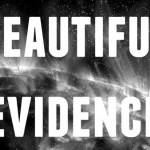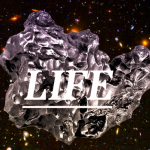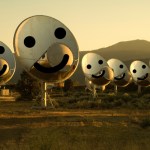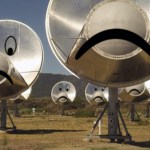Problems
To scientists, "experimental" is a technical word, one with a precise meaning: that which relates to a procedure of methodical trial and error, to a systematic test for determining the nature of reality. I got in trouble on this blog once, with commenters, for using the word "experimental" too flippantly.
But artists experiment too, of course. Their method of inquiry is different, free from the rigidity that characterizes the scientific method. Artistic experiments are designed to be singular; they aren't supposed to be repeated. They have no control variables. Often, even the…
The Book of Exogenesis: In the beginning was the word, and the word was a meteorite...
Earlier this month, a report, based on NASA studies of meteorites found on Earth, suggested that some building blocks of DNA may have been formed in space.
As it turns out, DNA components have been found on meteorites before, but it's never been entirely clear if the space rocks came to Earth bearing these molecules, or if they were contaminated upon arrival. Furthermore, this recent study of meteorites was the first to discover trace amounts of three molecules -- purine, 2,6-diaminopurine, and 6,8-…
As you have undoubtedly heard from sources more overtly journalistic than this one, SETI is back online!
After federal and state financial cutbacks forced the institute's shiny new Allen Telescope Array (ATA) into indefinite hibernation earlier this year, cosmically-minded geeks all over the globe donated money in droves, bringing the search for extraterrestrial life back from oblivion. Over $200,000 in donations from thousands of fans -- including Contact's own Jodie Foster, science-fiction writer Larry Niven, and Apollo 8 Astronaut Bill Anders -- will get science operations up and running…
As you may have heard, SETI is in trouble.
Funding cutbacks on a state and federal level have forced the Allen Telescope Array -- SETI's new homebase, actually just a part of the U.C. Berkeley's Hat Creek Radio Observatory (HCRO) -- into indefinite hibernation. With U.C. Berkeley losing ninety percent of its NSF University Radio Observatory money this year, and the growing California budget shortfalls, the hunt for extraterrestrial life has simply, and pragmatically, fallen by the wayside.
This financial deficit particularly smarts because the Allen Telescope Array was just about to…
I believe the world is a complex phenomenological experience that can be explained, rationalized, and lived in myriad different ways. The way I see it, we all begin with the same fundamental mystery -- why are we here? what is life? -- and we attack this problem with whatever tools we find work best; some of us use science, parsing and decoding the secrets of life with a toolbox of methods and reason. Others, with the same goals in mind, use art, arranging ideas and objects in intentional ways designed to root at the questions of existence. Others still depend on the framework of religion to…
What do these three quotations have in common? Hint: it lives in a petri dish.
"To live, to err, to fall, to triumph, and to recreate life out of life." -- James Joyce
"What I cannot build, I cannot understand." -- Richard Feynman
"See things not as they are, but as they might be." -- from American Prometheus, a biography of the nuclear physicist Robert Oppenheimer
Although James Joyce could never have imagined it, his words -- and those of Feynman and Oppenheimer, too -- are no longer relegated to library stacks, but instead live on inside an unlikely host: the world's first synthetic…
The North Korean government has made an operating system called "Red Star."
Despite the fact that very few North Koreans have a computer, let alone Internet access, Red Star is designed to provide a safe operating environment in line with North Korean political philosophy of "juche," or self-reliance (as well as, admittedly, monitor user activity).
The Red Star O.S. takes fifteen minutes to install, uses a popular Korean folk song as its start-up music and features a calendar which starts counting time from the birth of Kim Il-sung, making 2010 the year 99. Amazingly, it's Linux-based, with…
I don't have the attention span to write this article.
In the course of penning this introductory paragraph, I've taken umpteen email breaks, gotten distracted by several Wikipedia wormholes, and taken an hour's time out to watch Frontline documentary clips on YouTube. It has taken me, in toto, seven days to write a five-paragraph article about my generation's decreasing attention span. At least the irony isn't lost on me.
A social researcher tracking my movements across the web might discover that, in the words of University College of London professor and director of CIBER (the Centre…
A couple of years ago, I was poking around in a European art museum and came across an exhibit of exquisitely beautiful Eastern Orthodox religious paintings, "icons." Beyond being visually striking -- they have an austere, hieratic, distant quality -- they are also, I realized at the time, in a way, scientific.
Alright, I know, that's a wild statement. But hear me out.
A religious icon is more than a painting. It has a semiotic value that's highly codified, a language and practical purpose of its own that sets it apart from all the other representational art preceding our modern era of…
Photograph by Benjamin Reed.
Ursula K. Le Guin is a internationally-recognized, award-winning science fiction writer, an elegant badass and the author of such classics as the Hugo and Nebula-award winning The Left Hand of Darkness, The Lathe Of Heaven, and the Earthsea novels. Last year, she began mounting formidable opposition to the Google Books Settlement, an inscrutably complex 303-page agreement reached between the Authors Guild, the Association of American Publishers and Google regarding the Web giant's desire to scan the libraries of the world. The Settlement, if approved -- it…
Whilst they (as Homer's Iliad in a nut)
A world of wonders in one closet shut
-- Inscription on the Tradescant family tombstone, London
There are two things which have deeply terrified me in recent science news. The first, as you may have heard, is that a bumper crop of some 32 "new" planets was discovered by a team of European researchers armed with a spectrograph called HARPS, or High Accuracy Radial velocity Planetary Searcher. The second is that Israeli scientists have made a robot small enough to crawl through human veins.
The offending nanobots.
Why do these things strike horror in…
Recently, Rhizome.org invited me to contribute a long-form article to their Rhizome Writer's Initiative, a new program designed to give emerging and established writers the opportunity to pontificate on the world of new media arts. I was glad to do it, especially when I realized that the exhibition I was to review is called "Beam Me Up" and that the themes it dissects coincide neatly with my recent re-appreciation of Star Trek. I include my finished article here on Universe because I think some of the ideas discussed in it dovetail well with the recent topics here--systems, complexity,…
One of Buckminster Fuller's most interesting conceits was his dislike of specialization, which he likened to a kind of intellectual prison, restraining "bright" people from truly understanding the complex, and general, systems of which they were a part. After all, he argued, what causes extinction in the animal kingdom? Overspecialization. Of course, it's logical, and it's s problem we see over and over again in human history, from the Industrial Revolution displacing specialized factory workers to the often daunting gap of comprehension between the social and "hard" sciences. As soon as we…
Universe has a firm "No Skepticism" policy.
Don't get me wrong, I dig empirical knowledge. And I like the ancient, Pyrrhonian school of Skepticism founded by Pyrrho of Elis (365-275 B.C.); Pyrrhonian skeptics believed that nothing could be known, not even "this" (i.e the very statement that nothing could be known) and strived for a constant state of inquiry as a source of pleasure. Since absolute knowledge is unattainable, the Pyrrhonian Skeptics felt that their end was: "In opinionatives, indisturbance; in impulsives, moderation; and in disquietives, suspension," which is essentially…
Let's try a thought experiment.
This one comes via Buckminster Fuller: imagine you have a length of nylon rope, which you splice into a length of cotton rope, then into another length of hemp rope. If you tie an overhand knot in the rope, and push it down, through all three kinds of ropes, the knot remains a knot. The material is irrelevant, because the knot is just a pattern that has a specific set of guidelines for itself. Fuller wrote that "a pattern has an integrity independent of the medium by virtue of which you have received the information that it exists." That is to say, if you…
It always tickles me when people email me to ask my opinion of pressing science issues, and I've decided to start posting selected exchanges for the benefit of all my readers. Remember, if you have any questions, concerns, or just want to jaw at me about all things science, feel free to write.
On Sep 9, 2008, at 4:39 PM, Christian Oldham wrote:
Hi Claire,
I'm wondering what your opinions are on the whole idea of the Large Hadron Collider and the possibility of the creation of miniature black holes.
5,
Christian Oldham
On Sep 9, 2008, at 4:53 PM, Claire Evans wrote:
Hi Christian,
How awesome…
Dear readership,
As far as I know, I have never used this website as a political platform. I have weakly festered under the steely gaze of a particularly anti-science American administration without uttering much of a peep, but this, however, I cannot let stand.
The Arecibo telescope is the world's largest radio telescope and currently the source of all the data processed and used by various (and already much-maligned) SETI projects, particularly SETI@home. Currently, it's facing massive budget cuts that will effectively end its ability to continue the search for life beyond Earth. The…
Fraser Cain over at Universe Today sent out a question to the Astronomy/Astrophysics/Space communication community today. And he asks:
Why should we spend our time/money/resources on exploring space when there are so many problems here on Earth?
This is something that, for better or worse, I had a knee-jerk reaction to. Here's what I wrote back to him:
This is like asking why we should spend money on making our city better when there are so many problems here in our own homes. Or why we should spend money on understanding our whole world when there are so many problems here in our own…
Occasionally, I day-trip from the borders of legitimate science and into the boundless holiday that is the esoteric. I don't know exactly why I take such pleasure in pseudo-science; perhaps it is to keep my work safe from those who might portend I am out of my league with the real stuff.
The lush, seemingly benign woods of the Pacific Northwest abound with myths, quasi-tragic histories, tucked-away lichen, hallucinogenic mushrooms, endangered animals, and wild men. They also set an unwitting and shadowy stage, perhaps appropriately, for one of the great dramas of the esoteric: Bigfoot.…
When our futures become the past, what will they prove to have been like?
As mind-bending as this question is, it lies at the heart of every successful science fiction story. Good writers in this underappreciated genre can be so forward-thinking that instead of asking, "What will the future be like?" they are already devising an answer to, "How will the future become the past?"
It's with this understanding of the malleability of time that good science fiction (which I have trouble feeling isn't the only relevant kind of writing) also manages to deftly place its reader in a chronological…








